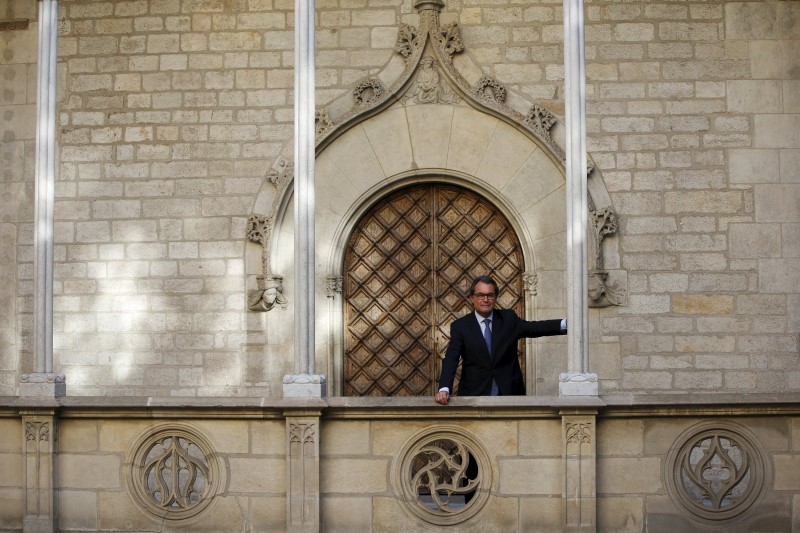By Julien Toyer
BARCELONA (Reuters) - The head of Catalonia's regional government says a unilateral split from Spain is unstoppable unless the central government agrees to call a binding referendum on independence.
Artur Mas threw down the gauntlet to Madrid less than a week before a local election which Catalan separatists have billed as a proxy vote on secession.
Spanish Prime Minister Mariano Rajoy has repeatedly ruled out a breakaway by the wealthy northeastern region and opposed any attempt to hold a referendum.
Mas did not expect matters to change after a national election due in December as not only the ruling People's Party (PP) but also the opposition Socialists and the smaller Ciudadanos party oppose such a possibility.
"I am very skeptical that a new Spanish government could offer a deal to Catalonia on holding a referendum," Mas said in an interview with Reuters at the 16th Century Palau de la Generalitat regional headquarters.
"Now, if the question is 'will you stop the political process in Catalonia', the answer is no until we have the certainty that we have a specific date for a binding referendum on independence," he said.
Mas also said a political solution based on a new tax deal or a constitutional accommodation for Catalonia was now off the table and that Spain's constitutional court would not manage to block a declaration of independence.
"Three years ago I would have said yes to a fiscal pact but the government in Madrid blocked all negotiations and refused this possibility. Now we have to vote on self-determination, we have to vote on independence."
"If we get a clear and specific democratic mandate on Sept. 27, things will change because in the end the independence depends on our will.
"The fiscal pact depends on the will of the Spanish government, the change of the Spanish constitution depends on the will of the Spanish population, but the independence of Catalonia depends on the will of the Catalans."
PRESSURE
Catalonia has won a large measure of political and cultural autonomy since the end of the Franco dictatorship, which had repressed the region, including banning the use of the Catalan language. But separatist sentiment has surged in recent years under the slogan "Catalonia is not Spain".
Polls predict that pro-independence parties will win a majority of seats in the regional parliament in next Sunday's regional election but fall short of a majority of vote.
That would not stop them from triggering an 18-month "road map" to independence, Mas said, although most analysts say secession remains unlikely, not least because it would lack popular legitimacy.
The movement has in recent weeks come under attack from Spanish banks and business. The European Union has also warned that there would be no automatic place in the bloc for an independent Catalonia.
Spain's central bank chief said Catalonia would be booted out of the euro zone and a freeze on deposits may be imposed if it declared independence.
Major Spanish banks, including Catalonia-based Caixabank and Sabadell, said a split would be a serious threat to financial stability in the region.
Mas dismissed that peril and accused the central Madrid government of pressuring the Catalan banks.
"I am sure that the Spanish institutions and the Spanish government has put a lot of pressure on those (banks). In fact they report to those Spanish institutions right now so it's quite logical that they bind to this pressure from the central government," he said.
Caixabank and Sabadell declined to make any comment.
